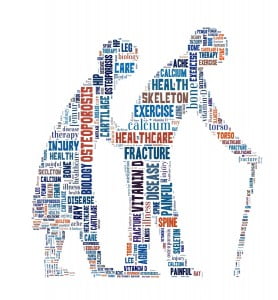Did you know there’s a link between Gluten and Osteoporosis?
We all love our bread, pizza, and beer pasta. I do too. Especially the beer 🙂 All of these contain gluten. However, as I was instructed by my osteoporosis consultant (!) that the love affair has to end. For the next six months, minimum, I have to follow a gluten exclusion diet. I’m not exactly delighted, but needs must.
It’s all because I have brittle bones / osteoporosis at the tender age of 41. I’m told there is a direct link between gluten sensitivity and bone density issues such as osteopenia / osteoporosis. That sensitivity can block your ability to absorb vitamins and macronutrients that keep your bones strong. Every day’s a school day, eh?
Before we agreed a treatment plan, my consultant insisted that we find out why I had osteoporosis in the first place. Many blood tests ensued including liver and thyroid function etc, and on further discussion (and hindsight) we realised I have a sensitivity to gluten. So as I take my first round of medication, she has recommended I go gluten free in the hope that it will improve my absorption of vitamins and macronutrients and therefore the efficacy of the treatment. The end goal is to reverse my osteoporosis, through medication as well as diet and exercise. Both of which are within my [will] power.
It means I need to follow Coeliac Society guidelines on removing gluten from my diet. I already knew that gluten affected me – I feel tired and bloated after eating pasta, have horrible hangovers from just a couple of beers and generally can’t eat bread without needing a snooze afterward. Thankfully for me, I’m not as sensitive as many coeliacs who suffer hugely when “glutened”. For many a gluten free diet is not a choice – it’s a fact of life.
Many establishments are realising there’s a huge potential market for gluten free products and are getting on the bandwagon these days which is great. However, and it’s a big one, not all of them are meet Coeliac Society guidelines. Even the slightest cross contamination can affect coeliacs so it’s important to check ingredients as well as the Food Lists issued regularly by the Coeliac Society. Some gluten free products include a lot of unpronounceable ingredients too, so it’s always good to check the label.
If you are affected by bone density issues, ensure you should find out why you have osteoporosis before deciding on a treatment with your doctors. If you are Coeliac, then have a DXA scan, a painless analysis of your bone density to see if you have any loss of bone. My diagnosis happened by chance via a DXA scan as part of a general health check, it was completely unexpected as I am very active and eat well. Both are silent diseases, but will respond well to changes in diet, and exercise and medication in the case of osteoporosis.
Have you been diagnosed with osteopenia / osteoporosis and were you checked for a gluten sensitivity? If you are coeliac, was a DXA scan suggested to check your bone density? Let us know your experience in the comments.

